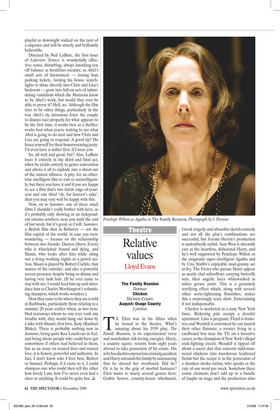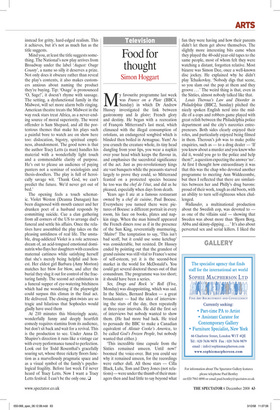Relative values
Lloyd Evans
The Family Reunion Donmar Chicken Hackney Empire August: Osage County Lyttelton
T.S. Eliot was in his fifties when he turned to the theatre. What’s amazing about his 1939 play, The Family Reunion, is its experimental verve and nonchalant risk-loving energies. Harry, a country squire, returns from eight years abroad to take possession of his estate. His wife has died in a mysterious cruising accident and Harry astounds his family by announcing that he shoved her overboard. Did he? Or is he in the grip of morbid fantasies? Eliot wants to marry several genres here, Gothic horror, country-house whodunnit, Greek tragedy and absurdist sketch-comedy and not all the play’s combinations are successful, but Jeremy Herrin’s production is undoubtedly stylish. Sam West is shrewdly cast as the heartless, delusional Harry, and he’s well supported by Penelope Wilton as the enigmatic super-intelligent Agatha and by Una Stubbs’s enjoyable mad-granny act as Ivy. The Furies who pursue Harry appear as neatly clad schoolboys carrying butterfly nets, their angelic faces whitewashed in ashen grease paint. This is a genuinely terrifying effect which, along with several other aorta-tightening flourishes, makes this a surprisingly scary show. Entertaining if not indispensable.
Chicken is marketed as a zany New York farce. Bickering pals occupy a derelict apartment. Lina is pregnant, Floyd is homeless and Wendell is convinced he can launch their other flatmate, a rooster living in a cardboard box near the TV, on a lucrative career as the champion of New York’s illegal cock-fighting circuit. Wendell is tipped off about a secret diet that converts mild-mannered chickens into murderous feathered fiends but the recipe is in the possession of a drunken stroke-victim, who speaks at the rate of one word per week. Somehow these comic elements don’t add up to a bundle of laughs on stage and the production aims instead for gritty, hard-edged realism. This it achieves, but it’s not as much fun as the title suggests.
Mind you, at least the title suggests something. The National’s new play arrives from Broadway under the label ‘August: Osage County’, a name so silly it deserves a prize. Not only does it obscure rather than reveal the play’s contents, it also makes customers anxious about naming the product they’re buying. Tip: ‘Osage’ is pronounced ‘O, Sage!’, it doesn’t rhyme with sausage. The setting, a dysfunctional family in the Midwest, will set more alarm bells ringing. American theatre treats the Midwest in the way rock stars treat Africa, as a never-ending source of moral superiority. The worst offender is Sam Shepard, and all the portentous themes that make his plays such a painful bore to watch are on show here too: dislocation, bigotry, spiritual emptiness, abandonment. The good news is that the author Tracy Letts (a man) handles his material with a wonderfully light touch and a commendable clarity of purpose. He’s out to please an audience of paying punters not a seminar of sociologists and thesis-doodlers. The play is full of heroically savage wit. ‘Thank God, we can’t predict the future. We’d never get out of bed.’ The opening feels a touch schematic. Violet Weston (Deanna Dunagan) has been diagnosed with mouth cancer and her drunken poet of a husband responds by committing suicide. Cue a clan gathering from all corners of the US to arrange dad’s funeral and settle his affairs. Once the relatives have assembled the play takes on the pleasing untidiness of real life. The unstable, drug-addicted Violet is a role actresses dream of, an acid-tongued emotional dominatrix who flays her daughters with ceaseless maternal cattiness while satisfying herself that she’s merely being helpful and honest. Her eldest girl Barbara (Amy Morton) matches her blow for blow, and after the burial they slug it out for control of the fracturing family. The second act culminates in a funeral supper of eye-watering bitchiness which had me wondering if the playwright could surpass this climax in the final act. He delivered. The closing plot-twists are so tragic and hilarious that Sophocles would gladly have used them At 210 minutes this blisteringly acute, wonderfully funny and deeply heartfelt comedy requires stamina from its audience, but don’t sit back and wait for a revival. This is the production to see. Under Anna D. Shapiro’s direction it runs like a vintage car with every performance tuned to perfection. Look out for Todd Rosenthal’s gracefully soaring set, whose three rickety floors function as a marvellously pragmatic space and as a visual symbol of the family’s psychological fragility. Before last week I’d never heard of Tracy Letts. Now I want a Tracy Letts festival. I can’t be the only one. ❑



















































































 Previous page
Previous page